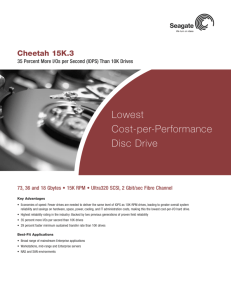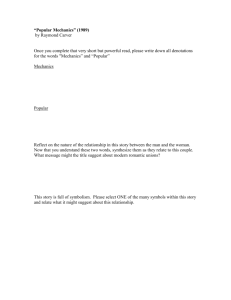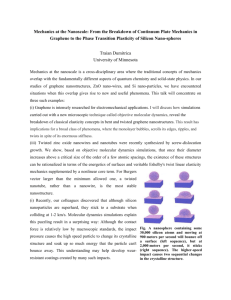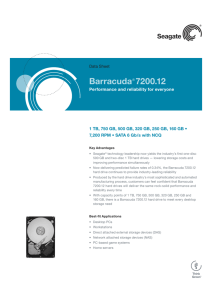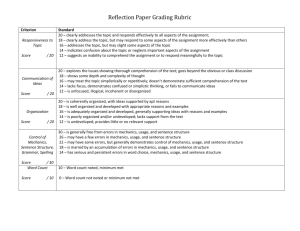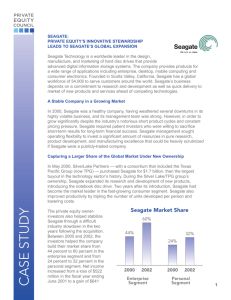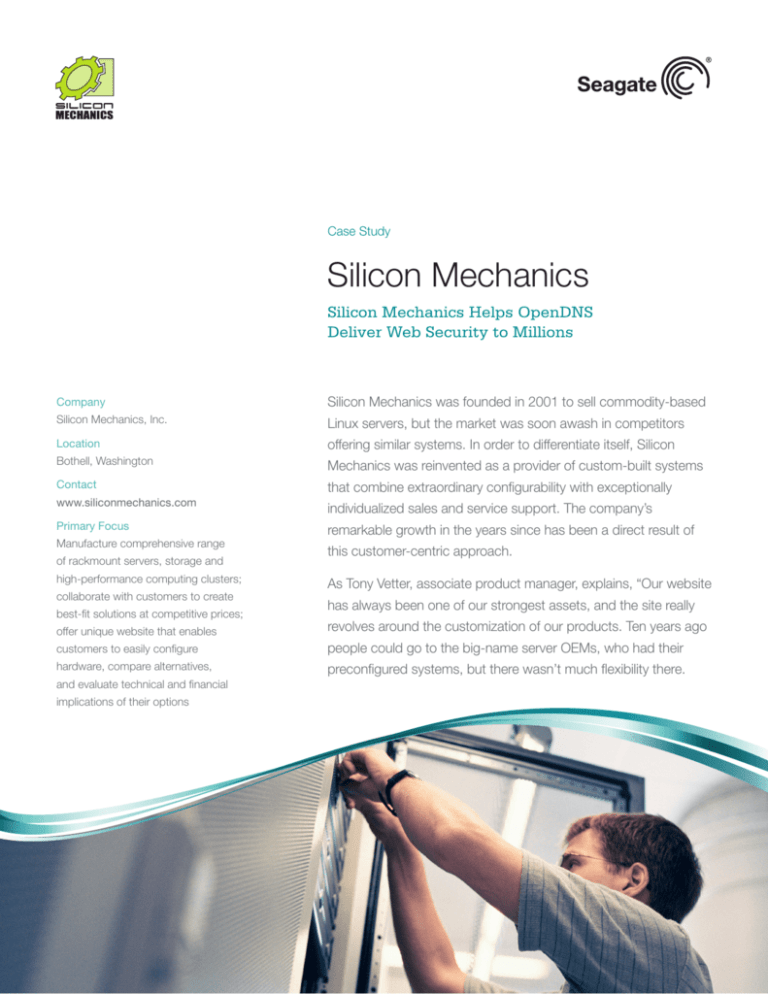
Case Study
Silicon Mechanics
Silicon Mechanics Helps OpenDNS
Deliver Web Security to Millions
Company
Silicon Mechanics was founded in 2001 to sell commodity-based
Silicon Mechanics, Inc.
Linux servers, but the market was soon awash in competitors
Location
offering similar systems. In order to differentiate itself, Silicon
Bothell, Washington
Mechanics was reinvented as a provider of custom-built systems
Contact
that combine extraordinary configurability with exceptionally
www.siliconmechanics.com
individualized sales and service support. The company’s
Primary Focus
remarkable growth in the years since has been a direct result of
Manufacture comprehensive range
of rackmount servers, storage and
high-performance computing clusters;
collaborate with customers to create
best-fit solutions at competitive prices;
this customer-centric approach.
As Tony Vetter, associate product manager, explains, “Our website
has always been one of our strongest assets, and the site really
offer unique website that enables
revolves around the customization of our products. Ten years ago
customers to easily configure
people could go to the big-name server OEMs, who had their
hardware, compare alternatives,
preconfigured systems, but there wasn’t much flexibility there.
and evaluate technical and financial
implications of their options
Silicon Mechanics
Silicon Mechanics Helps OpenDNS
Deliver Web Security to Millions
I think that’s really where we came into our own, addressing the
customizable, small rack-mount server markets. And it still holds true today.”
Silicon Mechanics has garnered an enviable reputation (and an impressive
array of top-tier clients spanning business, academia and the public sector)
by always putting the needs of its customers first. So when a young, techsavvy startup known as OpenDNS needed hundreds of custom-configured
servers equipped with vast storage capacity, it naturally turned to Silicon
Mechanics . . . and the Seagate® Constellation® ES.2 capacity-optimized
hard drive.
Billions Served Daily (and Securely)
In just five short years, OpenDNS has achieved a level of success that’s
stunning, even by the lofty standards of its Silicon Valley neighbors. Now
boasting over 30 million very passionate users around the world, OpenDNS
has become the industry’s safest, fastest, smartest and most reliable
provider of DNS (Domain Name System) services. Its remarkably diverse
user base employs OpenDNS for a variety of reasons.
The company initially gained notoriety for its superior speed, handling DNS
queries far faster than the relatively sluggish DNS servers employed by most
ISPs; new users flocked to the service, which by its first month end had
already handled a billion DNS queries.
But best-in-class Web security and content filtering are the core of the
OpenDNS value proposition; clients from Fortune 100 enterprises to
individual home users can easily configure online security tools that protect
against malware, phishing and botnet infections, as well as enabling
selective traffic blocking to undesirable sites. Web-based reporting tools
also enable any of its 30-plus million users to analyze their usage statistics—
entailing a hefty storage burden on OpenDNS.
George Patterson, director of operations at OpenDNS, elaborates: “We
do approximately 32 billion DNS requests per day. Many of our customers
choose to have us store their networks’ DNS traffic data for analytics and
security purposes. So we need lots and lots of reliable storage that is fast to
access. Because of how our storage and reporting services are built, with
lots of servers holding lots of hard drives, the performance and reliability of
each drive is paramount in building an overall system that delivers a highperformance solution with the utmost reliability.”
More Than Just Raw Capacity
With those requirements in mind, Silicon Mechanics chose the 3TB Seagate
Constellation ES.2 hard drive for the hundreds of servers it custom-built
for OpenDNS. According to Shane Huntress, inside sales team manager at
Silicon Mechanics, “It wasn’t just the specific strengths of the Constellation
ES.2 drives that convinced us, Seagate excels on everything else too.
It wasn’t just the specific strengths
of the Constellation® ES.2 drives
that convinced us, Seagate
excels on everything else too.
As far as reliability, channel
support . . . Seagate is really good
to us. We definitely prefer them
for those reasons, as well as
price, availabilities, all the things
that matter to the channel. Very
impressed.
Shane Huntress
Silicon Mechanics
Silicon Mechanics
Silicon Mechanics Helps OpenDNS
Deliver Web Security to Millions
As far as reliability, channel support . . . Seagate is really good to us. We
definitely prefer them for those reasons, as well as price, availabilities, all
the things that matter to the channel. Very impressed.”
Patterson concurs: “The 3TB Seagate Constellation ES.2 drives were just a
really great fit for us. Plus we’ve always been treated right by Seagate, so
I’m pretty happy with them.”
Purpose-built for rigorous 24×7 storage duties like those found at OpenDNS,
the capacity-optimized Constellation ES.2 drive delivers enterprise-class
storage in bulk-data environments by combining best-in-class reliability
(1.2 million hours MTBF), vast capacity (up to 3TB) and class-leading
rotational vibration tolerance (key to maintaining consistent, reliable data
access and performance in high-density applications such as rack servers).
To Learn More:
Seagate® Constellation® ES.2
Hard Drives
For more information on utilizing
Constellation ES.2 drives, visit
www.seagate.com.
Furthermore, Constellation ES.2 drives operate on average at fewer than
12W, the lowest 3TB drive operating power in the industry. And storage
professionals can save up to 54% more on energy usage costs by
implementing Seagate® PowerChoice™ technology’s on-demand idle power
savings feature, standard on every Constellation ES.2 hard drive.
Powerful Partnerships
So in this case Seagate just happened to be the storage vendor of choice?
“Well, it’s not really so much that they’re our drive vendor for this particular
application,” Huntress of Silicon Mechanics continues. “They’re our drive
vendor because of a lot of reasons: They provide a competitive price, a great
product line covering pretty much every performance and capacity point that
customers are interested in, and drives are available in both SAS and SATA
interfaces. Overall, we prefer Seagate drives, using them in about 80% of
our storage solutions.”
Patterson of OpenDNS is similarly enthusiastic about his partnership with
Silicon Mechanics: “Their website is outstanding. It lets me try different
types of hard drives and RAM and actually design the system we want
without having to order all the components and build it ourselves,” explains
Patterson. “And Shane is great about showing me better ways to achieve
my goals. It’s really helpful having a vendor who’s technical like that, who
can ensure we’re getting the right system or configuration. It definitely
makes my job easier.”
www.seagate.com
AMERICAS
ASIA/PACIFIC
EUROPE, MIDDLE EAST AND AFRICA
Seagate Technology LLC 10200 South De Anza Boulevard, Cupertino, California 95014, United States, 408-658-1000
Seagate Singapore International Headquarters Pte. Ltd. 7000 Ang Mo Kio Avenue 5, Singapore 569877, 65-6485-3888
Seagate Technology SAS 16–18, rue du Dôme, 92100 Boulogne-Billancourt, France, 33 1-4186 10 00
© 2012 Seagate Technology LLC. All rights reserved. Printed in USA. Seagate, Seagate Technology and the Wave logo are registered trademarks of Seagate Technology LLC in the United States and/or other
countries. Constellation and PowerChoice are either trademarks or registered trademarks of Seagate Technology LLC or one of its affiliated companies in the United States and/or other countries. All other trademarks
or registered trademarks are the property of their respective owners. When referring to drive capacity, one gigabyte, or GB, equals one billion bytes and one terabyte, or TB, equals one trillion bytes. Your computer’s
operating system may use a different standard of measurement and report a lower capacity. In addition, some of the listed capacity is used for formatting and other functions, and thus will not be available for data
storage. Seagate reserves the right to change, without notice, product offerings or specifications. CS548.1-1201US, January 2012

